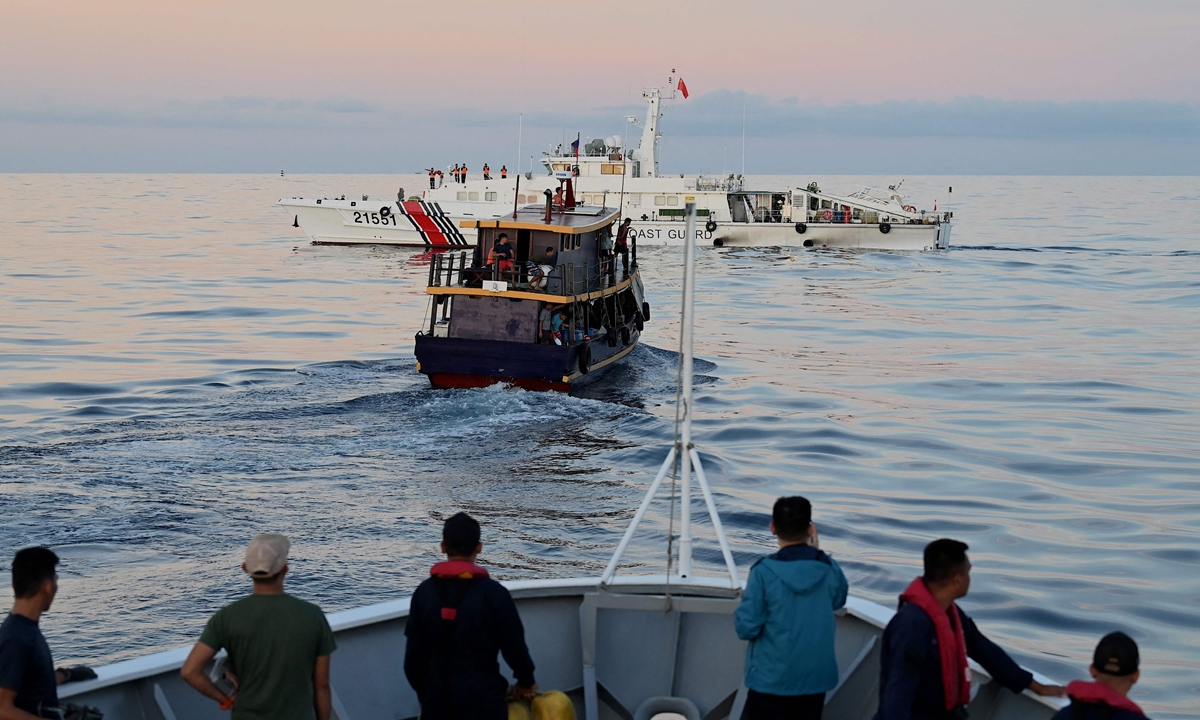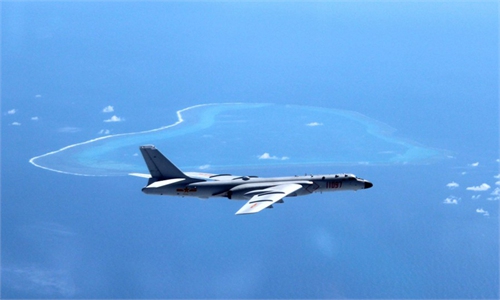
China urges some Philippines ships to immediately cease its infringing actions on November 10, 2023. Two small Philippine transport ships and three Philippine Coast Guard ships illegally entered the area on that day without China's permission. Photo: Visual News
The Philippines has seriously misjudged the situation, which will harm its own interests, future cooperation with China, as well as the common aspirations of regional countries for peace, stability and prosperity, analysts said on Monday, following Philippine President Ferdinand Romualdez Marcos Jr stating that the Philippines and China remain deadlocked over the joint oil exploration and accused China of posing a "regional challenge."
In an interview with the Japanese media NHK on Saturday, Marcos stressed that the Philippines will deepen trilateral cooperation with Japan and the US and seek to conduct more joint exercises.
Marcos said that tensions in the South China Sea have "increased" in recent months, warning that a "more assertive China" posed a "real challenge" to its Asian neighbors, according to media reports.
Chinese Foreign Ministry spokesperson Wang Wenbin said at a press briefing Monday that "the Philippines, bolstered by external support, has brushed aside China's goodwill and restraint and repeatedly challenged China's principles and red line. This is the major risk that could drive up tensions at sea."
"We hope the Philippines will realize that tying itself to some major power and forcing China to back down on issues concerning China's core interests will lead nowhere. Ultimately, it is the Philippines' own interests and the region's peace and stability that will take the toll," Wang emphasized.
Marcos also said his country is eyeing options to resolve exploration issues in the South China Sea so it could start new energy exploration projects before the country's Malampaya gas field runs dry, according to media reports.
Marcos said the progress on negotiations for exploration has been "very little" due to its location of "a conflict area." "We're still at a deadlock right now."
In November 2018, Beijing and Manila has signed a joint MOU on joint exploration for oil and gas in South China Sea, including setting up two negotiation committees. But in 2022, the Philippines ordered the termination of the discussions due to "issues on the country's sovereignty."
The Philippines and China resumed talks on joint exploration in the first half of 2023, but the escalating provocations from Manila derailed any attempts to reach compromise.
According to Chen Xiangmiao, director of the world navy research center at the National Institute for South China Sea Studies, Marcos' remarks reflected the actual energy needs of the Philippines, but there are no signs of willingness to improve China-Philippines relations.
China is always open to joint energy exploitation with world-leading capabilities and technology, but the premise is that the Philippines needs to stop provocative actions in the South China Sea and truly shows its sincerity, Chen said.
Li Haidong, a professor at the China Foreign Affairs University, told the Global Times on Monday that Philippine policymakers have seriously misjudged the situation, shortsightedly believing that they can use external forces to put pressure on China and gain benefits beyond reasonable demands.
Manila's mind-set and practices have undoubtedly eliminated the possibility of complementary cooperation between China and the Philippines in the energy sector, Li noted.
According to Li, the US and Japan have strategic needs to manipulate the Philippines to make trouble and create tensions in the South China Sea. "They will even throw the Philippines into the fire when necessary, leaving Manila to bear the tragedy on its own."
The current policy choices of the Philippines harm not only the Philippines' own vital interests, but also its cooperation space with China, as well as damaging the common aspirations for peace, stability and prosperity in the regional context, Li said.


